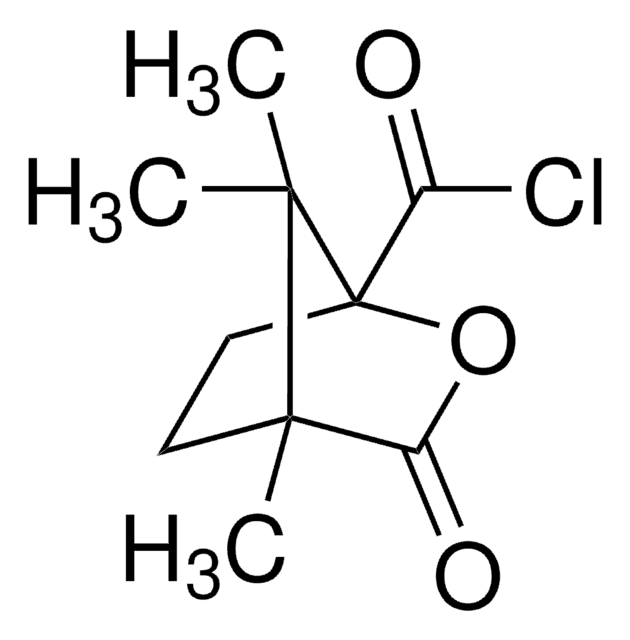335975
(+)-1-(9-Fluorenyl)ethyl chloroformate solution
18 mM in acetone, for chiral derivatization
Synonym(s):
(+)-FLEC solution
Sign Into View Organizational & Contract Pricing
All Photos(1)
About This Item
Empirical Formula (Hill Notation):
C16H13ClO2
CAS Number:
Molecular Weight:
272.73
MDL number:
UNSPSC Code:
12352005
PubChem Substance ID:
NACRES:
NA.22
Recommended Products
grade
for chiral derivatization
Quality Level
vapor density
2 (vs air)
vapor pressure
180 mmHg ( 20 °C)
form
liquid
concentration
18 mM in acetone
refractive index
n20/D 1.3602
density
0.79 g/mL at 25 °C
functional group
chloro
storage temp.
2-8°C
InChI
1S/C16H13ClO2/c1-10(19-16(17)18)15-13-8-4-2-6-11(13)12-7-3-5-9-14(12)15/h2-10,15H,1H3
InChI key
SFRVOKMRHPQYGE-UHFFFAOYSA-N
Looking for similar products? Visit Product Comparison Guide
Related Categories
General description
(+)-1-(9-Fluorenyl)ethyl chloroformate is a highly fluorescent compound1 commonly used as a chiral derivatizing agent for the separation of racemates prior to reversed-phase HPLC analysis.
Application
- Chiral analysis of β-methylamino alanine (BMAA) enantiomers: Details the use of (+)-1-(9-fluorenyl)-ethyl chloroformate (FLEC) for derivatization followed by LC-MS/MS analysis, improving the understanding of amino acids′ stereochemistry (Zurita et al., 2019).
- Enantioselective micellar electrokinetic chromatography of dl‐amino acids: Utilizes (+)-1-(9-fluorenyl)ethyl chloroformate derivatization combined with UV-induced fluorescence detection to analyze amino acids, enhancing analytical methodologies (Prior et al., 2018).
Signal Word
Danger
Hazard Statements
Precautionary Statements
Hazard Classifications
Eye Dam. 1 - Flam. Liq. 2 - STOT SE 3
Target Organs
Central nervous system
Supplementary Hazards
Storage Class Code
3 - Flammable liquids
WGK
WGK 3
Flash Point(F)
1.4 °F
Flash Point(C)
-17 °C
Choose from one of the most recent versions:
Already Own This Product?
Find documentation for the products that you have recently purchased in the Document Library.
Customers Also Viewed
Reversed-phase high-performance liquid chromatographic analysis of atenolol enantiomers in plasma after chiral derivatization with (+)-1-(9-fluorenyl) ethyl chloroformate.
Rosseel MT, et al.
Journal of Chromatography. B, Biomedical Applications, 568(1), 239-245 (1991)
Zeineb Aturki et al.
Electrophoresis, 25(4-5), 607-614 (2004-02-26)
The indirect resolution of five beta-adrenoreceptor blocking agents (propranolol, oxprenolol, pindolol, metoprolol, and atenolol) using precolumn derivatization with (+)-1-(9-fluorenyl)ethyl chloroformate (FLEC), and capillary electrochromatography (CEC) is reported. Three octadecylsilanized (ODS) silica gel-based stationary phases, differing in particle diameter and carbon
Radu-Cristian Moldovan et al.
Journal of chromatography. A, 1513, 1-17 (2017-08-02)
Over the last 30years, (±)-1-(9-fluorenyl)ethyl chloroformate ((±)-FLEC) was used as a chiral derivatizing agent in various analytical applications involving a wide range of endogenous, pharmaceutical and environmentally relevant molecules. This comprehensive review aims to present all the significant aspects related
Sascha Freimüller et al.
Journal of pharmaceutical and biomedical analysis, 30(2), 209-218 (2002-08-23)
An indirect enantioseparation method for robust and precise determination of D-Carnitine (D-C) in L-Carnitine (L-C) in the range of 0.1-1.0% is presented. The method is based on derivatization of Carnitine with (+)-[1-(9-fluorenyl)-ethyl]-chloroformate ((+)-FLEC). The two diastereomers are subsequently separated of
N Todoroki et al.
Journal of chromatography. B, Biomedical sciences and applications, 728(1), 41-47 (1999-06-24)
The natural occurrence of N-methyl-D-aspartate (NMDA) is limited to the foot muscle of Scapharca broughtonii; it is a well known compound for its neuroexitatory activity. This paper describes a high-performance liquid chromatographic (HPLC) method for the determination of NMDA in
Our team of scientists has experience in all areas of research including Life Science, Material Science, Chemical Synthesis, Chromatography, Analytical and many others.
Contact Technical Service












